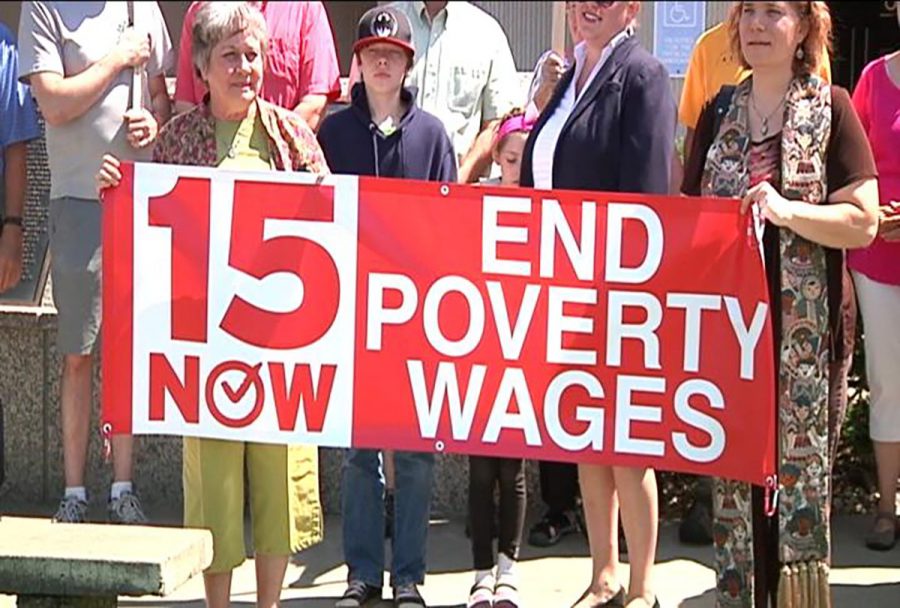Supporting Living Wages in Eau Claire
City Council moves to generate an ordinance that will increase minimum wage
More stories from Nicole Bellford
Photo by Submitted
Recent rallies in Eau Claire stir support for an increased minimum wage ordinance.
At first glance, the average member of society likely wouldn’t be able to make a distinction between the terms “minimum wage,” and “living wage.” Personally, I used to believe that the concepts were synonymous.
Unfortunately, the truth about these terms is quite the contrary. The Merriam Webster Dictionary defines minimum wage as “the lowest wage permitted by law or by a special agreement.” Living wage, on the other hand, is a concept that the Eau Claire City Council is attempting to integrate within the community.
“Living wage is a salary that allows for someone to afford the minimum cost of living in their community,” said local City Council member Andrew Werthmann. “It takes into account what minimum wage doesn’t; like the basic necessities, like putting groceries on the table.”
Werthmann said that the City Council is currently in the works of generating an ordinance that will raise the minimum wage to one of living wage for all Eau Claire city employees. The National Conference of State Legislatures (NCSL) explained that the last minimum wage increase for Wisconsin occurred in 2009, when it became $7.25 per hour. When this wage limit was set, NCSL said that the state law additionally restricted local governments from altering the state’s minimum wage, with the exception of that of city employees.
The City Council member explained that the state’s minimum wage cap has now become too outdated to be justified as suitable for the area’s current cost of living standards.
“The cost of living is definitely different from what it used to be,” said Werthmann. “We are seeing inflation in areas across the board. You just can’t work at $7.25 and hour and still be able to pay the bills.”
Werthmann couldn’t be more right. In Eau Claire specifically, poverty and homelessness is a recurring realm of trouble. Clear Vision reports that the community’s poverty rate is nearly 4 percent higher than the national average, leaving local homeless shelters in a state of overflow and approximately 1 in 5 children food insecure.
The statistics clearly evidence that this isn’t a problem to be overlooked any longer. The consequences of maintaining current minimum wage standards look grim for an area already experiencing such advanced rates of poverty and income issues.
For those that doubt the likelihood of the upcoming ordinance’s success, one needn’t look past national borders. The regional government of Seattle, Washington recently implemented a minimum wage increase from $9.50 an hour to $11 an hour in April 2015, according to the Washington Post. The Washington Post reports that a study done by the University of Washington has found the area’s transition to living wage to be an economic success story.
The study claims that the Seattle economy experienced a “boom” as a result of the wage change, with growth rates that “tripled the national average” and approximately a 10 percent increased likelihood of low-wage workers maintaining job security. Washington Post said that Seattle plans to steadily increase the living wage to $15 an hour by the end of 2017.
With evidence from national neighbors, it is difficult to doubt the concept of implementing identical success to an area that so desperately requires economic attention like Eau Claire. Seattle is setting a progressive example for local governments, and providing results that disprove common misconceptions of rising minimum wages causing eventual economic downfall.
Werthmann said that while the City Council has not created the ordinance yet, they plan to generate an initial living wage of $11.65 per hour, which equates to a salary that matches the poverty line in Eau Claire. Over the next five years, Werthmann said that the City Council hopes to increase the living wage to a rate of $14.95 per hour, resting approximately 15 percent above the local poverty line.
Overall, while the concepts of minimum wage and living wage pertain to a similar idea, the terms of a living wage clearly support an improved economy and attempt to discourage poverty problems. Hopefully, communities across the nation can follow in the footsteps of areas such as Seattle and Eau Claire, thus moving the country towards living wages rather than settling on mere minimums.


